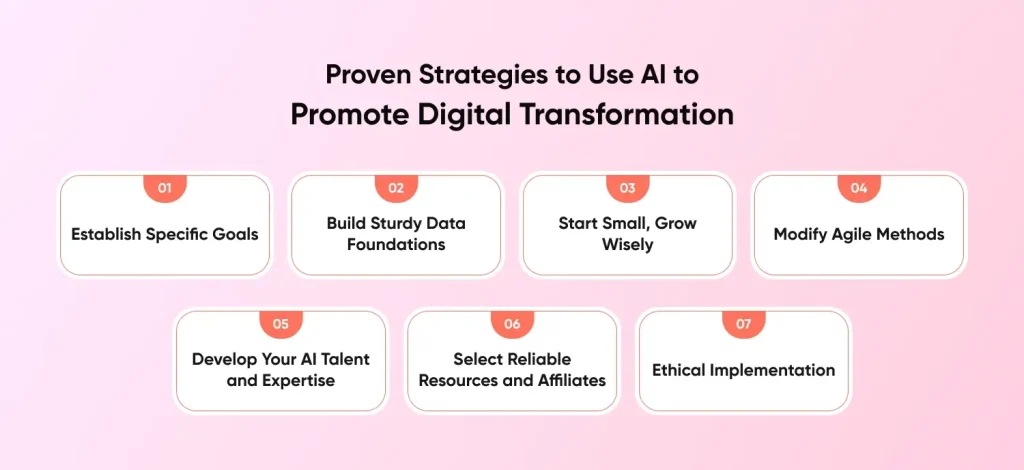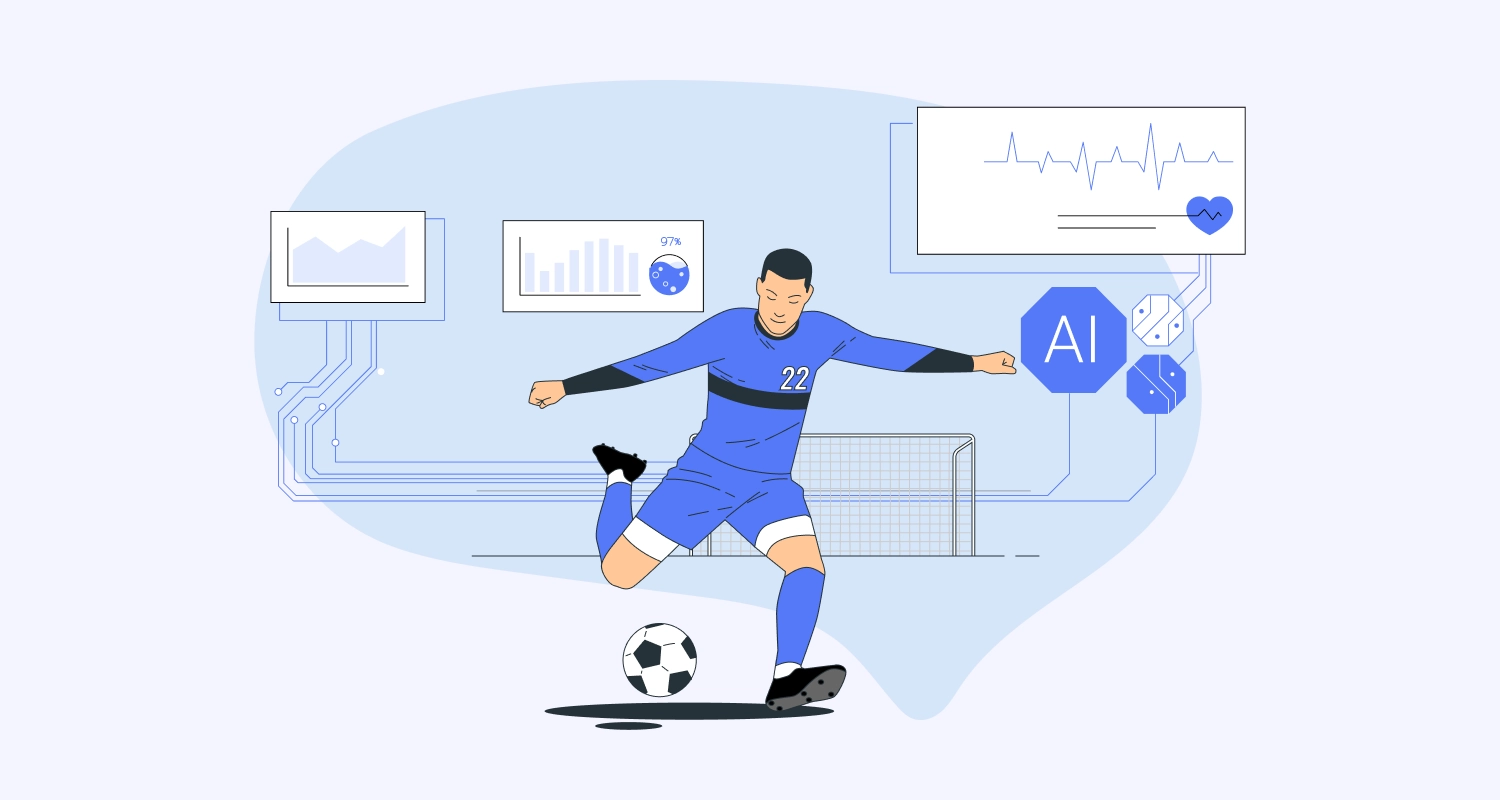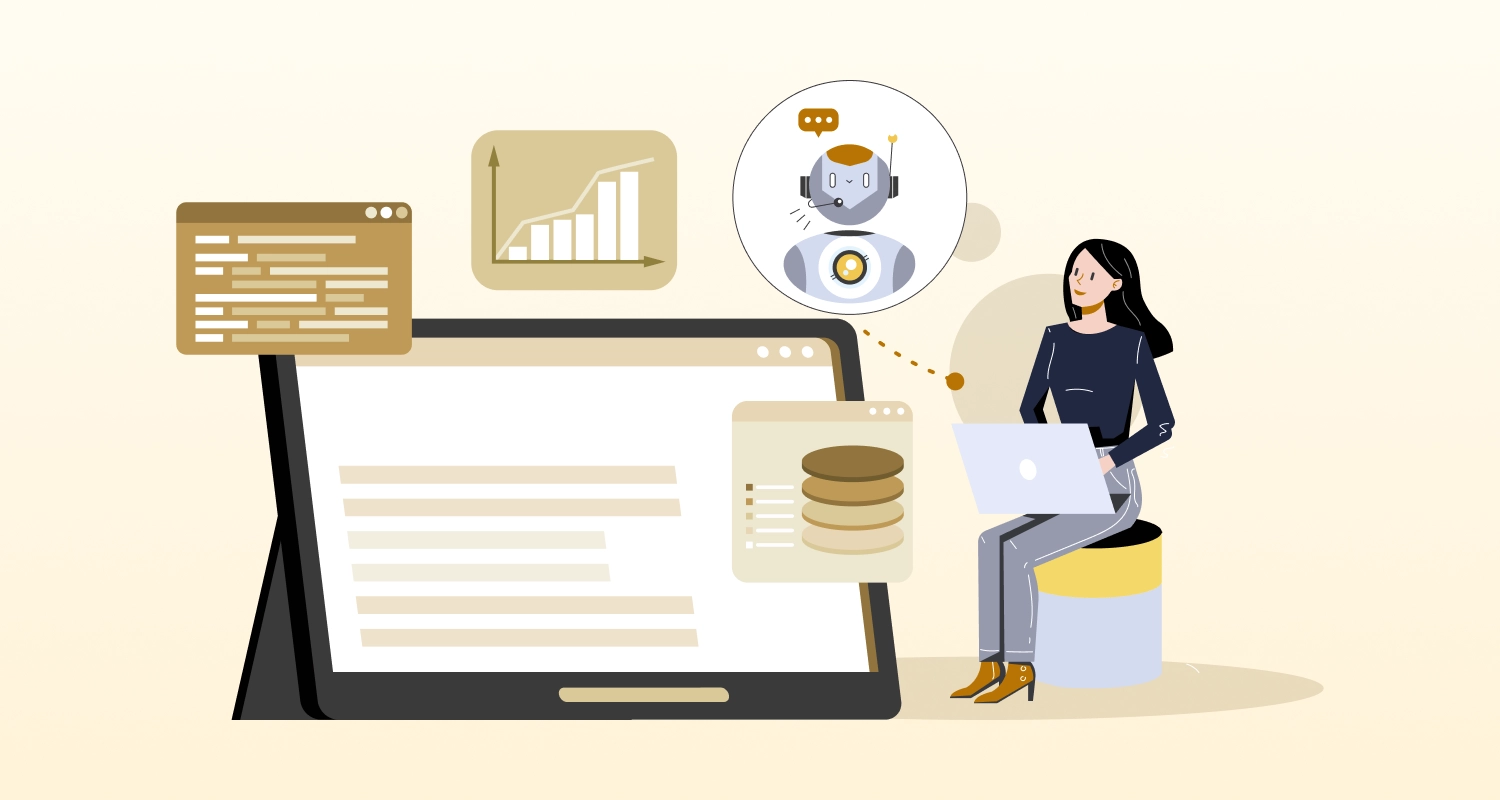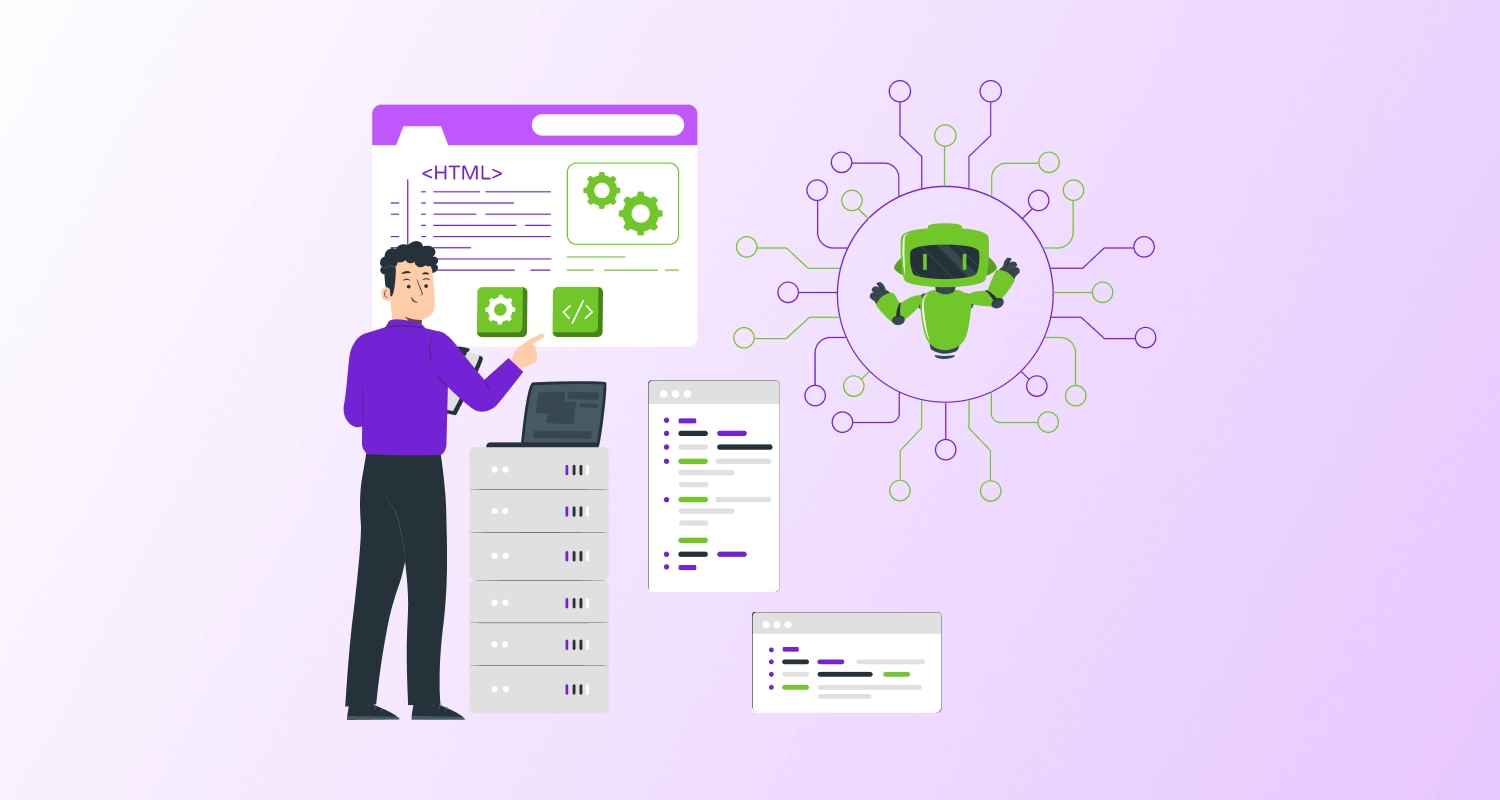The strategic integration of modern digital technologies is essential to future-proofing company processes and workflows in this AI era. AI stands out as a key component of the three digital transformation pillars: people, process, and technology, either by itself or in conjunction with other technical elements. Beyond simple automation, AI driven digital transformation revolutionizes processes, encourages creativity, and strengthens the ability to recognize patterns, and trends, and solve problems across a range of industries.
Today, businesses are witnessing growth outcomes from model-based AI with the full potential of digital transformation. The AI market in the next ten years is expected to grow by $2.95 trillion.
Are you eager to combine your AI business ideas to maximize the benefits of digital transformation? You should read this blog. We’ll talk about AI for digital transformation role, its main advantages, practical applications in various industries, and how it works with IoT, cloud, and data analytics.
What Capabilities Power the Initiatives for AI in Digital Transformation?
Businesses may completely rethink processes, consumer experiences, and entire business models thanks to AI. Its many features support corporate digitization by enabling increased productivity and efficiency, effective risk management, and flexibility for ongoing development. Let’s find out more about the fundamental AI skills that power digital transformation projects.
- Unlocking Data Potential: AI can automate data processing, identify patterns, and have a place in corporate intelligence. For future competitiveness, businesses may quickly make data-driven decisions and uncover hidden insights.
- Computer Vision: Through the clever combination of AI and ML, computer vision allows businesses that are going through a digital transformation to glean insightful business information from a variety of visual data sources, including pictures and videos. AI’s capacity to do this helps businesses achieve quality assurance more quickly and accurately.
- Functionality of Generative AI Solutions: Gen AI is becoming more and more popular because of its advantages, which include generating new types of data-such as text, photos, and code-and simplifying tasks for companies in a variety of sectors. For instance, generative AI in manufacturing boosts customer assistance, expedites product creation, and promotes production and inventory control.
- NLP: Through natural language processing, computers can understand and interpret the human language that serves as the foundation of chatbots, analysis, and language translation. Businesses may improve consumer interactions, expedite procedures, and gain fresh insights from massive volumes of unstructured data by utilizing AI for digital transformation.
- ML Algorithms: Because machine learning algorithms allow computers to independently analyze large volumes of data and learn from it, they are crucial for firms that are experiencing AI digital transformation. With the use of this capability, businesses may improve predictive analytics, automate difficult decision-making processes, and tailor customer interactions according to user preferences and behavior.
Use of AI in Various Industries for Digital Transformation
The widespread influence of AI on several industries demonstrates its adaptability and revolutionary potential. The way AI drives digital transformation across industries reveals how important a role it plays in changing operating environments.
Healthcare: Innovative AI Uses for Better Patient Care
Artificial Intelligence in healthcare startups is the biggest example of innovation in the health industry. A game changer that improves diagnosis and patient care. Machine learning algorithms help in diagnostics to analyze medical images for early detection. AI is used in personalized medicine to customize treatment regimens based on unique patient data, hence enhancing results. By anticipating possible health problems, predictive analytics helps with proactive healthcare management. AI-powered chatbots improve patient engagement by offering immediate assistance and information.
FinTech: Safeguarding Exchanges and Revolutionising Services
FinTech is at the forefront of integrating AI, making use of its powers to improve client services and conduct secure transactions. Real-time analysis of transaction patterns by fraud detection algorithms stops fraudulent activity. Investing tactics are optimized using algorithmic trading to yield larger profits. AI-powered automated customer care guarantees timely and individualized interactions, raising customer satisfaction levels all around.
Retail: Improving Operations and Customer Experiences
AI is changing operational efficiency and customer experiences in the retail industry. Machine learning-powered recommendation engines provide tailored product recommendations, improving the online buying experience. Demand forecasting powered by AI maximizes stock levels, minimizing overstock and guaranteeing product availability. For deeper insights into customer behavior, computer vision improves in-store analytics.
Software Development: Boosting Coding Innovation
AI is driving innovation in software development by speeding up development processes, increasing code quality, and automating coding activities. Development cycles are accelerated by automated code generation techniques, while software problems are predicted and prevented using machine learning app development. Coordination is improved, resource allocation is optimized, workflow automation is achieved, and more intelligent project management solutions.
AI in Logistics and Transportation
By improving predictive maintenance to lower vehicle downtime and operational costs, and by streamlining freight management and route planning for greater efficiency, artificial intelligence has completely transformed the transportation and logistics sector.
To optimize vehicle routes, artificial intelligence (AI) systems evaluate real-time data, including traffic conditions, weather forecasts, and delivery timetables. This optimization lowers fuel use, speeds up deliveries, and boosts the effectiveness of fleet management as a whole. By delivering items more consistently and effectively, businesses can reduce expenses and improve customer satisfaction.
Proven Strategies to Use AI to Promote Digital Transformation

Let’s examine methods for enhancing AI to make the most of its effects and yield significant advantages. It is imperative to comprehend that the revolutionary capacity of artificial intelligence may aid in improving project outcomes and yielding noteworthy benefits, hence facilitating your digital transformation.
Establish Specific Goals
Setting clear, quantifiable objectives that complement your company plan is essential when incorporating AI for digital transformation. To effectively guide AI projects, it is imperative to have clear objectives, regardless of the focus-improving customer experience, boosting revenue, or improving operational efficiency.
Build Sturdy Data Foundations
Make quality, accessibility, and security-focused data infrastructure a top priority to empower AI for digital transformation. These fundamental components are necessary to enable data-driven decision-making and to build strong machine-learning models.
Start Small, Grow Wisely
Start small with proofs of concept or pilot projects to verify AI solutions before expanding them throughout the organization. This strategy effectively leverages AI for digital transformation by allowing for early demonstration of measurable benefits, risk minimization, and viability testing.
Modify Agile Methods
Adopt agile approaches to react swiftly to shifts in the market and in technology. Agile methodologies help AI projects with adaptable planning, fast prototyping, and iterative development.
Develop Your AI Talent and Expertise
Invest in hiring and training personnel with backgrounds in generative AI in Data Science applications, and machine learning. Developing internal competencies allows the organization to innovate and sustainably implement AI.
Select Reliable Resources and Affiliates
Based on their compatibility with your technical needs, track record, and commercial goals, choose AI technology and outside partners. Partnerships and efficient tools are essential for the successful application of AI.
Ethical Implementation
When developing and implementing AI, transparency, justice, and accountability are a priority. To foster trust and reduce risks, address ethical issues including algorithmic transparency, data protection, and bias reduction.

AI Applications in Digital Transformation
While some companies have already begun using AI to revolutionize their operations digitally, others are still investigating this technology’s possibilities. The practical uses of AI in digital transformation are highlighted in this section.
Next-Gen AI Chatbots and Digital Assistants: Rule-based chatbots and intelligent virtual assistants are examples of AI-based customer support. Chatbots can only respond to frequently asked questions and offer users assistance and basic information.
AI in Predictive Analytics and Data Collection: Machine learning is a tool used by artificial intelligence (AI)-driven software and solutions to assist businesses in foreseeing potential outages. Furthermore, by thoroughly analyzing datasets or historical data to yield actionable insights, sophisticated data analytics empowers companies to develop data-driven marketing and sales strategies.
Cybersecurity: The advanced abilities of AI support cybersecurity by enabling real-time threat identification and response. Here are a couple of such examples: To ensure the safe implementation of digital transformation initiatives, artificial intelligence (AI) is being used to detect suspicious bodies and facial expressions for enhanced security screening, AI-driven crime prevention, the identification of vulnerable endpoints, and monitoring the most recent cybersecurity threats.
Monitoring Resources to Increase Productivity: Businesses may easily discover gaps, bottlenecks, and underutilization of resources with AI data analysis on resource allocation (people, materials, equipment, etc.). This results in optimized resource allocation and waste minimization. Predictive equipment maintenance also enables preemptive measures to avert expensive malfunctions and concentrate on patterns and trends for more efficient use of resources.
Experience AI-driven Digital Transformation by Partnering with CMARIX.
At CMARIX- an AI software development company, we assist businesses in transforming to digital journey through operational and strategic decisions, software product development, and digital consultancy services. We have a proven track record in almost every industry to compete in the ever-changing digital market.
We can also combine a wide range of contemporary technologies to boost productivity, efficiency, and business growth. Our innovative methodology and flexible workflows guarantee smooth project delivery, rapid upgrades, and seamless integration.
The team of professionals at CMARIX has extensive experience creating digitally enabled applications from scratch and updating legacy systems. Practice-tested proficiency in cloud computing, AI services, IoT development services, and advanced data analytics services allows us to unlock new possibilities, boost innovation, and provide insights for the future.
Frequently Asked Questions
How AI Works with the Cloud to Enhance Digital Transformation?
When combined, AI and digital transformation through cloud computing are a formidable force that propels digital change. With scalable cloud infrastructure and data storage capacity, AI systems can access processes and analyze big data effectively.
What Is the Importance of AI in Digital Transformation?
AI works as a catalyst, assisting systems in adjusting to fresh data or unforeseen modifications, which enhances corporate operations. By streamlining company procedures and automating repetitive operations, artificial intelligence is revolutionizing digital transformation and freeing human resources for more strategic responsibilities.
What Are Some Successful Examples of AI in Digital Transformation?
Here are a few examples of companies utilizing AI transformation: Chatbots for customer care that can respond to routine questions around the clock. With image detection using predictive analysis to optimize inventory becomes easy in the manufacturing industry resulting in fulfilling customer needs.
What Is the Future of AI in Digital Transformation?
The future of AI lies in the digital transformation initiatives that business takes to drive commercial success and compete in the market with various strategies and technologies.







